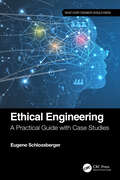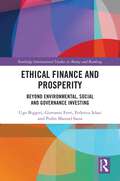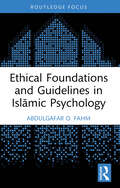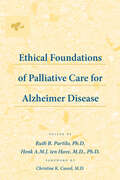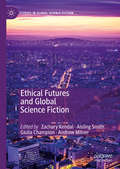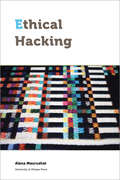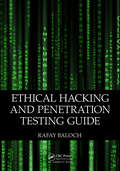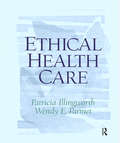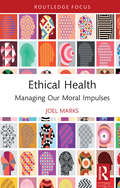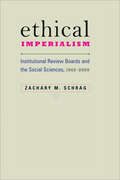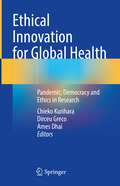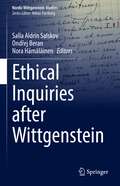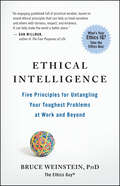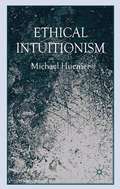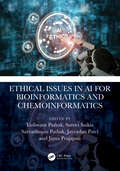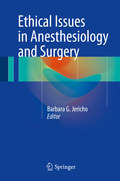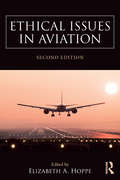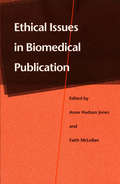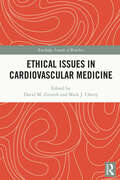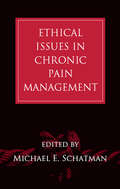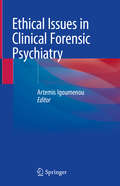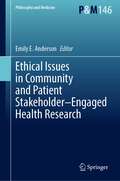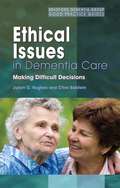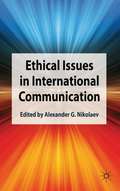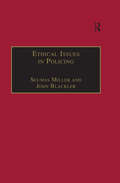- Table View
- List View
Ethical Engineering: A Practical Guide with Case Studies (What Every Engineer Should Know)
by Eugene SchlossbergerEthical Engineering: A Practical Guide with Case Studies provides detailed and practical guidance in making decisions about the many ethical issues practicing engineers may face in their professional lives. It outlines a decision-making procedure and helps engineers construct an ethics toolkit consisting of professional models, a comprehensive set of ethical considerations and factors that help in weighing those considerations, and analyses of particular issues, such as reverse engineering a patented process. Illustrating case studies, both brief and detailed, are provided. Features: • Introduces the nature of ethical decision-making as applied to engineering values and issues. • Helps readers develop a detailed ethics toolkit that identifies options and solutions and allows them to monitor and adjust as necessary. • Features topics such as safety, sustainability, bioethics, diversity and equality, information technology and AI, as well as critical areas often overlooked in engineering texts, such as mentoring, advertising (for consulting firms), engineering sales, and much more. • Includes 85 case studies to illustrate a variety of scenarios. • Offers an international perspective with codes of ethics from around the world, including Saudi Arabia, India, New Zealand, Chile, and Japan. Emphasizing the importance of the moral life and of engineering as an occupation with high ideals, this book helps readers navigate a variety of real-world ethical issues they are likely to face in this increasingly interdisciplinary, global, and diverse profession.
Ethical Finance and Prosperity: Beyond Environmental, Social and Governance Investing (Routledge International Studies in Money and Banking)
by Giovanni Ferri Ugo Biggeri Federica Ielasi Pedro Manuel SasiaThe debate on connections between economic activity and socio-environmental impact has become increasingly relevant. As a result, ethical finance is emerging from its niche. However, the terms "ethical finance" and "sustainable finance" are often confused and overlapping, and the risk of greenwashing is high. Many authors suggest the need of a paradigm shift because the present economic system is no longer able to maintain a safe environment. Tim Jackson explicitly argues about the need of a future of "prosperity without growth". From the experiences of ethical finance, we can identify some interesting tools to achieve that goal. This book explains how ethical finance works and which innovations it has engendered in financial and economic systems; clarifies the links between finance and ethics, going beyond Environmental, Social and Governance (ESG) investing, and offers an approach, which is vital for most financial sectors, from microcredit to impact investing; investigates the goals, constraints, and opportunities of environmental and social considerations in finance and explores the more innovative experiences in banking and investing. It helps readers understand the phenomena in depth, distinguishing the strategic, managerial, organizational, and risk practices of ethical finance. The authors adopt a holistic but critical approach, both with respect to the practices exercised by financial intermediaries, and with reference to new regulatory aspects. The book identifies the key issues and current challenges of ethical finance, both for financial operators and regulators. Several concrete international cases offer empirical comparisons of practices, and as such it will be an invaluable reference for academics and researchers who wish to deepen their knowledge of ethical finance.
Ethical Foundations and Guidelines in Islāmic Psychology (Islamic Psychology and Psychotherapy)
by AbdulGafar O. FahmThis book provides theoretical foundations and practical guidelines for an ethically competent integration of Islam and mental health practice. The book starts with a foundational introduction to the interface between Islam as a religion and mental health practice. It provides a summary of the ethical challenges and concerns raised in mainstream psychological literature along with a set of Islamically informed ethical guidelines for the integration of Islam and mental health practice. Taking into account the richness of the Islāmic tradition and the nuances of the Islāmic and Muslim cultures, these guidelines will include both general principles and specific considerations. The book concludes by exploring Islāmic ethics outside of the therapy room in relation to research and social justice.Filling a critical void in both Islāmic mental health literature and ethics literatures, this text provides mental health practitioners, instructors and researchers, and students worldwide with the tools for an ethical integration of Islam within mental health practices.
Ethical Foundations of Palliative Care for Alzheimer Disease
by Ruth B. Purtilo Henk A.M.J. ten HaveAlzheimer disease afflicts more than twelve million people worldwide, and its incidence is increasing at a staggering rate. People with the disorder are living longer than have those in previous generations, and they require interventions for quality-of-life issues associated with palliative care. However, the symptoms of Alzheimer disease often fail to place such persons into settings where palliative care resources are available to them. Indeed, clinicians and other caregivers may be unsure about what constitutes effective palliation in these cases. At the same time, the ethical issues involved in providing end-of-life care to persons with Alzheimer disease remain on the margins of mainstream bioethics.In Ethical Foundations of Palliative Care for Alzheimer Disease, leading ethicists and clinicians from the United States and Europe explore ethical and scientific concerns about the diagnosis and prognosis of Alzheimer disease, challenges arising from applying palliative procedures to its symptoms, key philosophical and theological concepts central to our understanding of the disease and to end-of-life decisions, and the changing patterns of relevant medical, social, and economic policies. Cross-cultural, multidisciplinary, and state-of-the-art, this volume is a unique and important resource for bioethicists, clinicians, and policy makers everywhere.Contributors: David A. Bennahum, M.D., University of New Mexico; Pierre Boitte, Ph.D., Catholic University of Lille, France; Roger A. Brumback, M.D., Creighton University Medical Center; Wim J. M. Dekkers, M.D., Ph.D., University Medical Centre Nijmegen, The Netherlands; Elizabeth Furlong, R.N., Ph.D., J.D., Creighton University Medical Center; Eugenijus Gefenas, M.D., Ph.D., Vilnius University, Lithuania; Bert Gordijn, Ph.D., University Medical Centre Nijmegen, The Netherlands; Amy M. Haddad, R.N., Ph.D., Creighton University Medical Center; Søren Holm, M.D., Ph.D., Dr.Med.Sci., University of Manchester; Franz J. Illhardt, D.D., Ph.D., Freiburg University; Rien Janssens, Ph.D., University Medical Centre Nijmegen, The Netherlands; Givi Javashvili, M.D., Ph.D., State Medical Academy of Georgia, Tbilisi; Judith Lee Kissell, Ph.D., Creighton University Medical Center; Gunilla Nordenram, D.D.S., Ph.D., Karolinska Institute, Stockholm; Richard L. O'Brien, M.D., Creighton University Medical Center; Marcel G. M. Olde Rikkert, M.D., Ph.D., University Medical Centre Nijmegen, The Netherlands; Winifred J. Ellenchild Pinch, R.N., Ed.D., Creighton University Medical Center; Patricio F. Reyes, M.D., Creighton University Medical Center; Anne-Sophie Rigaud, M.D., Ph.D., Hôpital Broca, Paris; Linda S. Scheirton, Ph.D., Creighton University Medical Center; Jos V. M. Welie, M.Med.S., J.D., Ph.D., Creighton University Medical Center.
Ethical Futures and Global Science Fiction (Studies in Global Science Fiction)
by Zachary Kendal Aisling Smith Giulia Champion Andrew MilnerEthical Futures and Global Science Fiction explores the ethical concerns and dimensions of representations of the future of global science fiction, focusing on the issues that dominate utopian, dystopian and science fiction literature. The essays examine recent visions of the future in science fiction and re-examine earlier texts through contemporary lenses. Across fourteen chapters, the collection considers authors from Algeria, Australia, Canada, China, Egypt, France, Germany, Haiti, India, Jamaica, Macedonia, Mexico, Russia, South Africa, the UK and USA. The volume delves into a range of ethical questions of immediate contemporary relevance, including environmental ethics, postcolonial ethics, social justice, animal ethics and the ethics of alterity.
Ethical Hacking (Law, Technology and Media)
by Alana MaurushatHow will governments and courts protect civil liberties in this new era of hacktivism? Ethical Hacking discusses the attendant moral and legal issues. The first part of the 21st century will likely go down in history as the era when ethical hackers opened governments and the line of transparency moved by force. One need only read the motto “we open governments” on the Twitter page for Wikileaks to gain a sense of the sea change that has occurred. Ethical hacking is the non-violent use of a technology in pursuit of a cause—political or otherwise—which is often legally and morally ambiguous. Hacktivists believe in two general but spirited principles: respect for human rights and fundamental freedoms, including freedom of expression and personal privacy; and the responsibility of government to be open, transparent and fully accountable to the public. How courts and governments will deal with hacking attempts which operate in a grey zone of the law and where different ethical views collide remains to be seen. What is undisputed is that Ethical Hacking presents a fundamental discussion of key societal questions. A fundamental discussion of key societal questions. This book is published in English. - La première moitié du XXIe siècle sera sans doute reconnue comme l’époque où le piratage éthique a ouvert de force les gouvernements, déplaçant les limites de la transparence. La page twitter de Wikileaks enchâsse cet ethos à même sa devise, « we open governments », et sa volonté d’être omniprésent. En parallèle, les grandes sociétés de technologie comme Apple se font compétition pour produire des produits de plus en plus sécuritaires et à protéger les données de leurs clients, alors même que les gouvernements tentent de limiter et de décrypter ces nouvelles technologies d’encryption. Entre-temps, le marché des vulnérabilités en matière de sécurité augmente à mesure que les experts en sécurité informatique vendent des vulnérabilités de logiciels des grandes technologies, dont Apple et Google, contre des sommes allant de 10 000 à 1,5 million de dollars. L’activisme en sécurité est à la hausse. Le piratage éthique est l’utilisation non-violence d’une technologie quelconque en soutien d’une cause politique ou autre qui est souvent ambigue d’un point de vue juridique et moral. Le hacking éthique peut désigner les actes de vérification de pénétration professionnelle ou d’experts en sécurité informatique, de même que d’autres formes d’actions émergentes, comme l’hacktivisme et la désobéissance civile en ligne. L’hacktivisme est une forme de piratage éthique, mais également une forme de militantisme des droits civils à l’ère numérique. En principe, les adeptes du hacktivisme croient en deux grands principes : le respect des droits de la personne et les libertés fondamentales, y compris la liberté d’expression et à la vie privée, et la responsabilité des gouvernements d’être ouverts, transparents et pleinement redevables au public. En pratique, toutefois, les antécédents comme les agendas des hacktivistes sont fort diversifiés. Il n’est pas clair de quelle façon les tribunaux et les gouvernements traiteront des tentatives de piratage eu égard aux zones grises juridiques, aux approches éthiques conflictuelles, et compte tenu du fait qu’il n’existe actuellement, dans le monde, presque aucune exception aux provisions, en matière de cybercrime et de crime informatique, liées à la recherche sur la sécurité ou l’intérêt public. Il sera également difficile de déterminer le lien entre hacktivisme et droits civils. Ce livre est publié en anglais.
Ethical Hacking and Penetration Testing Guide
by Rafay BalochRequiring no prior hacking experience, Ethical Hacking and Penetration Testing Guide supplies a complete introduction to the steps required to complete a penetration test, or ethical hack, from beginning to end. You will learn how to properly utilize and interpret the results of modern-day hacking tools, which are required to complete a penetration test. The book covers a wide range of tools, including Backtrack Linux, Google reconnaissance, MetaGooFil, dig, Nmap, Nessus, Metasploit, Fast Track Autopwn, Netcat, and Hacker Defender rootkit. Supplying a simple and clean explanation of how to effectively utilize these tools, it details a four-step methodology for conducting an effective penetration test or hack.Providing an accessible introduction to penetration testing and hacking, the book supplies you with a fundamental understanding of offensive security. After completing the book you will be prepared to take on in-depth and advanced topics in hacking and penetration testing. The book walks you through each of the steps and tools in a structured, orderly manner allowing you to understand how the output from each tool can be fully utilized in the subsequent phases of the penetration test. This process will allow you to clearly see how the various tools and phases relate to each other. An ideal resource for those who want to learn about ethical hacking but don‘t know where to start, this book will help take your hacking skills to the next level. The topics described in this book comply with international standards and with what is being taught in international certifications.
Ethical Health Care
by Patricia IllingworthOffering a format that is significantly different than that offered by other books, Ethical Health Care beings by asking what is meant by health and how it is achieved. The book then proceeds to explore with care and context the nature of the relationship between patients and clinicians, health care providers and the societies in which they inhabit, and finally the relationship between the health care enterprise and the international community. By emphasizing the ethical issues that arise in the broad quest to foster human health, and appreciating that health is not primarily a function of medical interventions, Ethical Health Care introduces students to problems such as the international distribution of pharmaceuticals and the dangers of reemerging infections. To a far greater extent than is done traditionally, Ethical Health Care provides an interdisciplinary perspective to bioethics, relying heavily upon the teachings of economics, law, and public health.
Ethical Health: Managing Our Moral Impulses (Routledge Focus on Philosophy)
by Joel MarksThis book argues that moralism is a troublesome emotion of the sort one might seek help with from a psychotherapist. Its focus is on how to disabuse ourselves of the illusion that our values are objective, as well as how to manage the manifestations of its residual presence.This thesis may seem odd at first blush because morality is commonly conceived as an antidote to our baser impulses. Desire makes us want to do something, but the voice of conscience urges us not to. If morality is conceived as a myth, as the author contends, then how shall we conduct our lives? The form of abolitionism put forward by the author goes beyond proposing the mere elimination of moral beliefs, attitudes, vocabulary, and institutions to encouraging their replacement by the rational vetting of our desires. He suggests that moralism, conceived as being motivated by belief in objective values, be treated similarly to, or even as, an emotional problem, akin to, or perhaps even identical to, the sort addressed by anger management programs in psychotherapy. By exposing our beliefs and desires to rational scrutiny, we can achieve our rational goals without the adverse side effects engendered by a fictitious moral overlay.Ethical Health will principally appeal to scholars and students working in meta-ethics and moral psychology and will also be of interest to clinical practitioners and inquiring laypersons.
Ethical Imperialism: Institutional Review Boards and the Social Sciences, 1965–2009
by Zachary M. SchragA powerful indictment of the IRB regime.University researchers in the United States seeking to observe, survey, or interview people are required first to complete ethical training courses and to submit their proposals to an institutional review board (IRB). Under current rules, IRBs have the power to deny funding, degrees, or promotion if their recommended modifications to scholars’ proposals are not followed. This volume explains how this system of regulation arose and discusses its chilling effects on research in the social sciences and humanities.Zachary M. Schrag draws on original research and interviews with the key shapers of the institutional review board regime to raise important points about the effect of the IRB process on scholarship. He explores the origins and the application of these regulations and analyzes how the rules—initially crafted to protect the health and privacy of the human subjects of medical experiments—can limit even casual scholarly interactions such as a humanist interviewing a poet about his or her writing. In assessing the issue, Schrag argues that biomedical researchers and bioethicists repeatedly excluded social scientists from rule making and ignored the existing ethical traditions in nonmedical fields. Ultimately, he contends, IRBs not only threaten to polarize medical and social scientists, they also create an atmosphere wherein certain types of academics can impede and even silence others. The first work to document the troubled emergence of today's system of regulating scholarly research, Ethical Imperialism illuminates the problems caused by simple, universal rule making in academic and professional research. This short, smart analysis will engage scholars across academia.
Ethical Innovation for Global Health: Pandemic, Democracy and Ethics in Research
by Chieko Kurihara Dirceu Greco Ames DhaiThis volume captures the recent changes and evolution in ethics in research involving humans and provides future directions to achieve alternative drug development strategies for equitable global health. It presents ethical considerations in current day clinical trials and new trends of ethics in research. It also describes the historical context, illustrates the process in alternative paradigms to achieve democracy after World War II, how the framework of ethics in research was established in different regions, and policies implemented to protect research participants from the exploitation of new drug development. The book is organized into three themed parts: relevant constructions from Brazil, South Africa, Taiwan, South Korea, and Japan; historical and international perspectives of principles of ethics in research; and alternative frameworks of clinical development and innovation. Ethical Innovation for Global Health: Pandemic, Democracy and Ethics in Research is an informative resource for academic researchers, the global pharmaceutical industry, regulators, civil society and other role players involved in global health. It is contributed to by leaders in global policy development in research ethics, and experts in drug development activities with its trajectory being global health. The COVID-19 pandemic, as a global disaster, necessitated not only socio-economic but also cultural transformation. While effective vaccines were developed under a successful new methodology, there remains inequity of distribution of these vaccines globally. The book re-engages with the notion of the primacy of distributing results of scientific innovation to those who most require the benefits.
Ethical Inquiries after Wittgenstein (Nordic Wittgenstein Studies #8)
by Nora Hämäläinen Ondřej Beran Salla Aldrin SalskovThis volume showcases contemporary, ground-up ethical essays in the tradition of Wittgenstein’s broader philosophy and Wittgenstein-inspired ethical reflection. It takes the ethical relevance of Wittgenstein as a substantial and solid starting point for a broad range of ongoing thinking about contemporary ethical issues.The texts are organised in two sections. The first consists of chapters exploring questions around what could be called the “grammar” of our moral forms of life, and thus represents a more traditional approach in ethics after Wittgenstein. The second part represents a recent turn in the tradition towards investigating moral conceptions, perspectives and concepts that are undergoing change, either because the world itself is changing (for instance with new technologies) or because human agency, such as social movements, has brought us to reconsider previously unquestioned ideas and structures.Within the book, the authors’ contributions are inspired, in their ways of working with ethical questions, by Wittgenstein’s conceptions of language, understanding and the nature of philosophical inquiry. This book is of interest to philosophers influenced by Wittgenstein, as well as to all ethicists seeking ideas for how to do philosophy in a manner close to lived experience and practice.
Ethical Intelligence: Five Principles for Untangling Your Toughest Problems at Work and Beyond
by Bruce WeinsteinEthical intelligence may not get as much attention as other forms of “smarts,” but as Bruce Weinstein shows, it is the most practical, valuable, and even courageous form, determining success on the job, ful?llment in relationships, and sense of self-worth. After reviewing the ?ve basic ethical principles agreed upon by cultures and religious traditions around the world and throughout time, Weinstein shows readers how to develop their ethics IQ by applying these principles in daily life. Real-world examples and interviews — with CEOs, athletes, celebrities, and political leaders — illustrate ethics in action, and their absence. Most strikingly, Weinstein shows that ethical principles aren’t just good; they are good for us, bene?ting our health, happiness, and prosperity. While ethical ignorance grabs headlines, it is ethical intelligence that creates the most ful?lling life.
Ethical Intuitionism
by Michael HuemerA defence of ethical intuitionism where (i) there are objective moral truths; (ii) we know these through an immediate, intellectual awareness, or 'intuition'; and (iii) knowing them gives us reasons to act independent of our desires. The author rebuts the major objections to this theory and shows the difficulties in alternative theories of ethics.
Ethical Issues in AI for Bioinformatics and Chemoinformatics
by Yashwant Pathak, Surovi Saikia, Sarvadaman Pathak, Jayvadan Patel and Jigna PrajapatiThis unique volume presents AI in relation to ethical points of view in handling big data sets. Issues such as algorithmic biases, discrimination for specific patterns and privacy breaches may sometimes be skewed to affect research results so that certain fields to appear more appealing to funding agencies. The discussion on the ethics of AI is highly complex due to the involvement of many international stakeholders such as the UN, OECD, parliaments, industry groups, professional bodies, and individual companies. The issue of reliability is addressed including the emergence of synthetic life, 5G networks, intermingling of human artificial intelligence, nano-robots and cyber security tools. Features Discusses artificial intelligence and ethics, the challenges and opportunities Presents the issue of reliability in the emergence of synthetic life, 5G networks, intermingling of human artificial intelligence, nano-robots, and cyber security tools Ethical responsibility and reasoning for using AI in Big Data Addresses practicing medicine and ethical issues when applying artificial intelligence
Ethical Issues in Anesthesiology and Surgery
by Barbara G. JerichoEach chapter includes an ethical challenge presented as a clinical case scenario that readers may relate to in their daily practice of anesthesiology and surgery. The ethical issues surrounding each chapter's content are examined in an easily understandable manner for the specific target audience to improve the understanding and management of ethical dilemmas in patient care. Informed consent issues for the adult and pediatric patient, perioperative considerations of do-not-resuscitate orders, ethical issues of drug shortages, transplantation ethics, surgical care of patients and futility, conscientious objection, informed consent and disclosure of surgeon experience, and research and publication ethics are included and based on the experience of the Editor and the roster of contributors.
Ethical Issues in Aviation
by Elizabeth A. HoppeThe aviation industry is unique in two major ways: firstly, it has a long history of government involvement dating back to the early days of aviation; and secondly, its primary concern is the safety of its passengers and crew. These features highlight the importance of ethical decision-making at all levels of the industry. However, well-publicized problems such as the disappearance of Malaysia Airlines Flight 370 highlight the need for ethics to take a more prominent role in the field. Ethical Issues in Aviation focuses on both past and current topics in aviation, providing the reader with an overview of the major themes in aviation ethics that cover a broad range of subjects. Contributors include academics who do research in the field as well as professionals who provide first-hand accounts of the ethical situations that arise in the aviation industry. This second edition has been thoroughly revised throughout to bring it up to date, and features several new chapters that cover recent events and topics. This book enhances student learning by providing faculty, students, and those interested in aviation with discussion of the most pressing ethical issues that continue to impact the industry.
Ethical Issues in Biomedical Publication
by Anne Hudson Jones Faith McLellanWhen the editors of two of the most prominent medical journals in the world—the New England Journal of Medicine and the Journal of the American Medical Association (JAMA)—were fired in the same year, under circumstances that ranged from acrimonious to politically sensational, media attention again focused on biomedical publication. The controversy highlighted yet another ethical dimension of scientific research and its publication, topics that have generated intense scrutiny in recent years. As research funding has become scarcer and competition fiercer, with links between scientific discovery and commercial applications increasingly tighter and more lucrative, allegations of misconduct have also increased. Universities and research institutions, notably the NIH, have created offices of scientific integrity and mandated educational programs to investigate such allegations and to train researchers in the highest standards of sound, ethical scientific research.Focusing on publication ethics as an essential aspect of responsible scientific conduct, Ethical Issues in Biomedical Publication examines a variety of troublesome issues, including authorship, peer review, repetitive publication, conflict of interest, and electronic publishing. The contributors include the editors of distinguished biomedical journals (among them, past or present editors of Academic Medicine, Annals of Internal Medicine, British Medical Journal, JAMA, and the Lancet), humanities scholars, scientists, lawyers, and a university administrator. Chapters address specific ethical issues and offer recommendations for preventing or solving problems associated with them. The result is a book that will serve as a standard reference for biomedical researchers, authors, editors, and teachers of research ethics."Educators, administrators, scientists, editors, and students should all welcome this comprehensive new book. Anne Hudson Jones and Faith McLellan have gathered a veritable who's who in the field of publication ethics for biomedical research. All those with a stake in biomedical research will surely want this volume on their bookshelf."—from the Foreword by Jordan J. Cohen, M.D., President, Association of American Medical Colleges
Ethical Issues in Cardiovascular Medicine (Routledge Annals of Bioethics)
by Mark J. Cherry David M. ZientekThis book provides an exploration of the ethics of cardiology practice. It provides a variety of frameworks for analyzing ethical issues that arise in cardiovascular medicine. Cardiovascular medicine—the diagnosis and treatment of congenital and acquired diseases of the heart, major arteries, and veins—has seen rapid change in diagnosis, treatment, and the organization of practice in the last half of the twentieth and the beginning of the twenty first century. The complexity of these developments has resulted in increasing subspecialization, and many practitioners are challenged to stay abreast with the latest developments in cardiology. These changes also bring with them various ethical challenges. The chapters in this volume are divided by five broad areas of practice: beginning-of-life, end-of-life, transplantation and allocation of expensive or scarce resources, professionalism, and research. The case-based approach presented across the volume provides a perspective that will allow readers to reason through current and future ethical issues as they arise in this rapidly changing field. Ethical Issues in Cardiovascular Medicine will be of interest to researchers working in bioethics, clinical ethics, and the philosophy of medicine, as well as practicing physicians, nurses, and students who work in cardiovascular medicine.
Ethical Issues in Chronic Pain Management (Pain Management Ser. #Vol. 1)
by Michael E. SchatmanSpecifically designed to address the needs of all specialists involved in the care of chronic pain patients, this source clarifies the ethical and legal issues associated with the diagnosis, assessment, and care of patients suffering from long-term pain. Divided into five comprehensive sections, this source covers a variety of topics to help the ch
Ethical Issues in Clinical Forensic Psychiatry
by Artemis IgoumenouThis work explores and discusses the ethical dilemmas clinicians face in everyday forensic psychiatry practice. We discuss and reflect on ethical issues involving treatment decisions such as antipsychotic polypharmacy, high doses antipsychotics and prescribing anti-libidinal medications. Ethical issues surrounding the use of technology for the management of mentally disordered offenders are explored in depth. The use of the polygraph test, a controversial method of truth facilitation for sex offenders, is discussed. Similarly, we discuss the use of "tagging" for serious offenders that despite being used in the United States of America for a while it has been heavily criticized and opposed. Tagging is gradually being introduced in the UK and other European countries, making consideration of the ethical issues and dilemmas surrounding its use both timely and necessary. This work is a valuable guide for clinicians working in forensic psychiatry settings, particularly when faced with ethical dilemmas concerning decisions around interventions.
Ethical Issues in Community and Patient Stakeholder–Engaged Health Research (Philosophy and Medicine #146)
by Emily E. AndersonThis book provides in-depth analyses of a wide range of topics surrounding ethical issues in community and patient stakeholder–engaged health research, and highlights where consensus exists, is emerging, or remains elusive. Topics in this book cover the history of stakeholder engagement in health research; how codes of ethics and regulations have (or have not) addressed stakeholder engagement; how to promote equitable collaboration; the ethical perspectives of different stakeholders; and the unique challenges posed by stakeholder- engaged research to the protection of human research participants and the research ethics review process. The book includes discussion of unique issues that arise in stakeholder engagement relevant to different populations, settings, and research designs. This book is relevant for anyone with a role or interest in stakeholder-engaged research, including patient and community research partners; academic researchers; research ethics scholars and educators; and funders.
Ethical Issues in Dementia Care: Making Difficult Decisions
by Julian C. Hughes Clive BaldwinBradford Dementia Group Good Practice Guides There are always difficult day to day decisions to be faced when caring for a person with dementia - from knowing how to deal with wandering to end of life decisions. Many of these decisions are underpinned by value judgments about right and wrong and reflect a particular view of dementia. This book considers these ethical decisions in the context of relationships, treatment, safety and quality of life, offering practical guidance and advice. It draws on the experiences of family carers as well as on existing research and emphasizes the importance of empathy and the need to acknowledge different perspectives in order to reach the best decision for the person with dementia. In particular the authors discuss the way that decision makers are themselves changed by the decisions they make, and the impact of this on the decision-making process. This book should be read by all those who work caring for people with dementia.
Ethical Issues in International Communication
by Alexander G. NikolaevThisunique collectionexplores contemporary ethical issues and problems in international communication. Written by scholars from around the world focusing on global ethical issues for a global audience, the volume considers theoretical issues of international communication ethics and provides specific practical examples and case studies. Key areas within the field of international communication are discussed, includingjournalism, international PR and public communication, political rhetoric andeducation, making this an important inclusion to the current literature. "
Ethical Issues in Policing: Philosophical And Ethical Issues (Springerbriefs In Ethics Ser.)
by Seumas Miller John BlacklerPolice Studies constitute an important area of academic inquiry and policing raises a large number of ethical questions, yet to date there has been a paucity of research on the subject. This significant volume provides an integrated mix of ethico-philosophical analysis combined with practitioner knowledge and experience to examine and address the large number of difficult ethical questions involved in modern-day policing. Key features: ¢ Outlines a distinctive philosophical theory of policing which promotes the human rights dimension of police work. ¢ Analyzes the phenomenon of noble cause corruption and ways to combat it. ¢ Examines the role of restorative justice. ¢ Discusses the related notions of police authority and police discretion. ¢ Assesses the use of coercive and deadly force. ¢ Provides a detailed discussion of recent issues such as privacy and confidentiality in the context of new communication and information technologies, and entrapment. Philosophical in approach and written in an accessible style, the book will be a valuable guide for all those with an interest or involvement in Police Studies, Criminology, Philosophy and Ethics.
